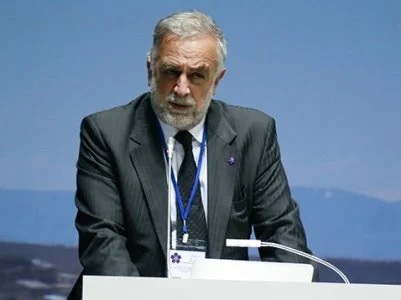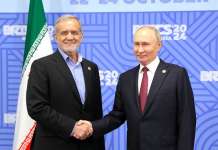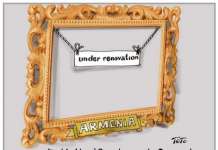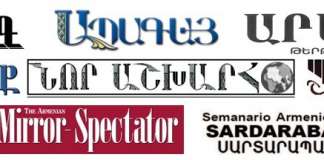Luis Moreno Ocampo, the first chief prosecutor of the International Criminal Court, also was on hand at the tenth anniversary celebrations of the UWC Dilijan school. Armenian News-NEWS.am asked him several questions.
Mr. Ocampo, today, we are here in Dilijan to mark the tenth anniversary of the establishment of the UWC Dilijan School, but the cofounder of this school, Ruben Vardanyan, is illegally kept in Baku for already a year and faces a trial based on false accusations. What do you think? Is the refusal of Azerbaijan to set him free because of his huge investments in the future of the Armenian people? What do you think?
Ruben Vardanyan and the other Artsakh [(Nagorno-Karabakh)] leaders are in jail in Baku because they are victims of genocide. It’s a message to the rest of the Nagorno-Karabakh people: “if you come back, we will attack you.” and that is sad, because it’s exactly how the genocide in 1915 started. The Turks threw the Armenian elite in jail, and now it’s happening here. So, he’s in jail, and he’s a hostage, because it’s a message to the rest of the Armenians; “don’t come back, don’t deal with us.”
Have you had any personal experiences with Ruben Vardanyan? How do you feel about the fact that he’s in Baku right now?
Last year, when I was trying to analyze the situation in Nagorno-Karabakh, I called him and I met him by Zoom. He is one of the two leaders of Nagorno-Karabakh I have met. So, for me it was very painful that he is in jail. That’s why, for me, being in this School is particularly important, because when you see his vision here—the idea of educating kids from all over the world in this beautiful setting, in a village in Armenia—it’s extraordinary, and it’s a shame that he is in jail today. For me, the question is: how can the School transform the painful experience of Ruben into an educational project? Because what happened to the Armenians in Nagorno-Karabakh could happen at any moment in different places. We have the conflicts in Gaza, in Ukraine, in Israel—everywhere. So, we should educate our kids on how to deal with these problems, and that’s why the idea to do something connected with Ruben is not just about “Well, the kids should do something for the person who created this place,” but it would also be a way for them to understand and learn how to manage and be involved in global problems.
What should be done for the release of Ruben Vardanyan and other Armenian prisoners who are illegally kept in Baku? Do you see any prospects for the solution of this problem within the framework of international law, or is the solution to this problem mainly political?
No, the problem is that there is no reason for them to be in jail, and there are no judges in Azerbaijan that could order their release. It’s not just me saying this. The U.S. State Department analyzed in 2023 the judiciary system in Baku, in Azerbaijan, and they saw that there are tortures and killings in the prisons, and there is no independent judiciary. So, there is no judiciary there to investigate any crime. So, we need Mr. Aliyev to release them, and COP29 is an opportunity to push for it. Armenia has to undertake this, and everyone does, too. The fight for Armenia and the fight for Ruben is a fight for civilization. It’s a fight to protect these types of ideas. That’s what we’re doing, and we should be doing this.
Is this your first time in UWC Dilijan? What are your impressions?
Yes. Well, when you are here, you see the quality of the buildings, the quality of the teachers, the quality of the programs, the quality of the students. How is the man who created this in jail in Baku, and how is it not a global shame?
UWC Dilijan School has had hundreds of graduates coming from all over the world, and they are foreigners who eventually form a network of people who are aware of the history of Armenia and its current challenges. What do you think? How can that network help Armenia face its current and future challenges?
I don’t think it’s just the School that needs to be leading a solution to the problem. I think we need to have a chance to do something together. That’s why, this year, I participated in a global campaign using the same hashtags repeatedly. The hashtags were #StopGreenwashingGenocide and #FreeArmenianHostages. People with different ideas all shared the same hashtag. That was a way to get collective action on the part of the world, while respecting diversity. There were participants from 30 different countries doing this. We have to fight now until COP29 and then keep fighting, because the risk is not just for Nagorno-Karabakh or Ruben. Armenia itself is at risk. I was in the south, I saw Azerbaijan arming the mountains, so I said, “Armenia is at risk.” So, this will not end with COP29.
















